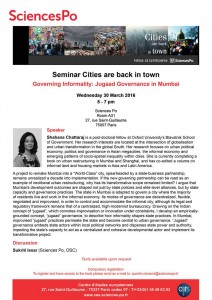« Governing Informality: Jugaad Governance in Mumbai »
Shahana Chattaraj
Mercredi 30 mars 2016
17h-19h
Sciences Po, salle A31
27, rue Saint-Guillaume (75007)
L‘inscription est obligatoire pour les externes à Sciences Po. Les inscriptions sont ouvertes jusqu’au mercredi 23 mars 2016. Pour vous inscrire, merci d’envoyer un mail à : quentin.ramond@sciencespo.fr.
Compulsory registration for the external people to Sciences Po. Registration is open until March, 23rd 2016. Please send an email to : quentin.ramond@sciencespo.fr.
Pour les personnes externes à Sciences Po : Merci de veiller à vous présenter à l’accueil 10 minutes avant le début de la séance et de vous munir de vos papiers d’identité
For the external people to Sciences Po: Please arrive 10 minutes before the beginning of the seminar and to provide you with your identity papers.
Résumé de la présentation :
A project to remake Mumbai into a “World-Class” city, spearheaded by a state-business partnership, remains unrealized a decade into implementation. If the new governing partnership can be read as an example of neoliberal urban restructuring, why has its transformative scope remained limited? I argue that Mumbai’s development outcomes are shaped not just by state policies and elite-level alliances, but by state capacity and governance practices. The state in Mumbai is adapted to govern a city where the majority of residents live and work in the informal economy. Its modes of governance are decentralized, flexible, negotiated and improvised, in order to control and accommodate the informal city, although its legal and regulatory framework remains that of a centralized, high-modernist bureaucracy. Drawing on the Indian concept of “jugaad”, which connotes improvisation or innovation under constraints, I develop an empirically-grounded concept, “jugaad” governance, to describe how informality shapes state practices. In Mumbai, improvised “jugaad” practices permeate the state and become central to urban governance. “Jugaad” governance embeds state actors within local political networks and disperses state power and authority, impeding the state’s capacity to act as a centralized and cohesive developmental actor and implement its transformative project.
Biographie :
Dr. Shahana Chattaraj is a post-doctoral fellow at Oxford University’s Blavatnik School of Government. Her research interests are located at the intersection of globalisation and urban transformation in the global South. Her research focuses on urban political economy, politics and governance in Asian megacities, the informal economy and emerging patterns of socio-spatial inequality within cities
Discussion : Sukriti Issar (Sciences Po, OSC)
Texts are available upon request

